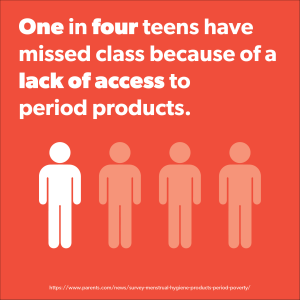Period Poverty
- FeliciaaBaldner
- Jun 6, 2021
- 2 min read
What exactly is Period Poverty?
The term Period Poverty refers to a circumstance of being unable to afford feminine hygiene products such as pads, tampons, liners and more to manage menstrual cycles and bleeding. In developing nations such as India, 1 in 4 girls will miss school due to the lack of available hygiene products. Not only that, but these girls will often feel ashamed and avoid going out due to inadequate access to clean washrooms, hand washing, and proper waste management. Therefore, access to necessary items such as feminine hygiene products must be considered a necessity, not a luxury.
Access to menstrual products is a right; feeling clean, confident, and capable during one’s period is a necessity. We must all work toward menstrual equity.
The sad truth is that Period Poverty is a largely ignored public health crisis, but that doesn't make it any less important. An item that is crucial to the health and well-being of all females is treated not as a necessity, but quite often has a luxury tax attached to it. For this reason, many women who can't afford to buy hygienic products are forced to choose sometimes between feeding their families or buying pads. Quite often, products like old rags, paper towels, or even cardboard are used by menstruators, but these often unhygienic solutions can put people at a higher risk for things such as infections, skin irritations, or worse.
In most developing countries, women and young girls who menstruate are excluded from basic activities, like eating certain foods, or socializing, all over the world. The cultural shame attached to menstruation and a shortage of resources, stop women from going to school and working every day.
This public health crisis can have extensive consequences. In some countries, girls are often pulled out of school once they have reached puberty to get married or because it is considered shameful to leave the house if they are "unclean." Additionally, a lack of knowledge and access to clean products can take an emotional toll, leading to poor mental health and higher depression rates for young women.
The only reason people do not hear much about this issue is that there is an immense amount of stigma surrounding it. This stigma dictates that a woman's period is something unclean or wrong to simply talk about, and it is often associated with disgust, shaming, or embarrassment, when in fact it should be recognized for what it truly is - a natural and rewarding biological process. The disgrace surrounding a woman's period effectively stops people from talking about it. Furthermore, preventing important conversations, such as how we can increase access to feminine hygiene products, from taking place.










